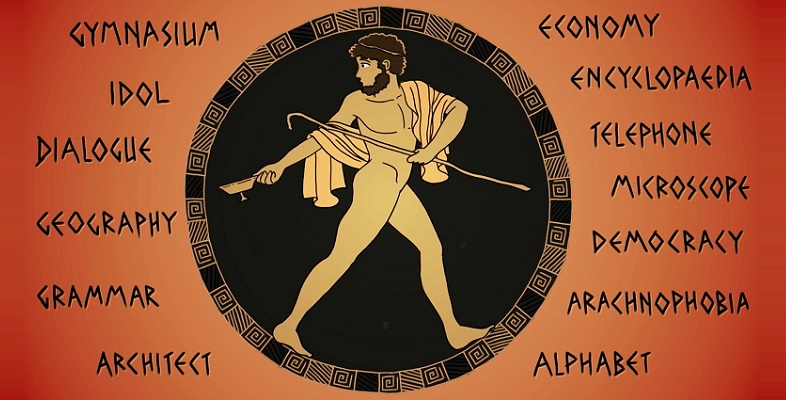2.4 Syntax
Syntax covers the rules for combining individual words into larger units such as phrases, clauses or sentences. An understanding of syntax helps you to recognise which combinations of words are allowed and which can be ruled out. The study of syntax and morphology is what is traditionally understood by the term ‘grammar’.
Three combinations have been introduced:
- A phrase consisting of two nouns, one in the genitive case:
- ἄγγελος θεοῦ a messenger of god (or god’s messenger)
- Ἀλέξανδρος Φιλίππου Alexander [son] of Philip
- Two basic sentence patterns:
- Subject + Verb + Direct Object:
- ὁ ἄνθρωπος διώκει τὸν ἵππον the man chases the horse
- Subject + Verb + Complement:
- ἡ Ἀφροδίτη ἐστὶ καλή Aphrodite is beautiful
The beginning of this session also showed how certain verbs, such as ‘dedicate’, raise the prospect of an indirect object as well as a direct object.
Hints and tips
A feel for syntax can help you understand how a sentence might unfold, to make predictions about what could come next and to know when a sentence is complete.
Activity 7 Test your knowledge of syntax
a.
Subject + Verb + Direct Object
b.
Subject + Verb
c.
Subject + Verb + Complement
The correct answer is b.
Discussion
The basic minimum is a Subject and a Verb. There might be other components, but that will depend on the nature of the verb. Remember that in Greek, the subject doesn’t need to be spelled out if it’s a personal pronoun like ‘I’ or ‘she’. It is implied by the ending or shape of the verb, for example: εἰμί, ‘I am’; φιλεῖ, ‘he/she/it loves’.
Look at the short list of verbs below and imagine coming across them in a sentence. Which of these verbs raises the expectation that the sentence contains a direct object?
- sleeps
- happens
- eats
- is
Discussion
The verbs ‘happens’ and ‘is’ cannot appear with a direct object, but ‘eats’ and ‘sleeps’ contain some subtleties. It is reasonable to expect a direct object after ‘eats’, as in ‘she eats fish and chips’. But that expectation might not be fulfilled, for example in the sentence: ‘She sits down and eats’. With the verb ‘sleeps’, an object would not be expected, though even here an exception can be devised: ‘He sleeps the sleep of the blessed’. These observations remind us that reading cannot be reduced to a set of rules, although knowing the rules is still of great importance; judgement, sensitivity and a ‘feel’ for what is likely or plausible are equally valuable.
a.
sleeps
b.
happens
c.
eats
d.
is
The correct answer is d.
Discussion
The answer here is more clear-cut than in the previous question. Only the linking verb ‘is’ raises the expectation of a complement.
a.
[a noun in the nominative case]
b.
[a noun in the accusative case]
c.
τὸν στρατόν
d.
οἱ Ἀθηναῖοι
e.
τοὺς Ἀθηναίους
The correct answers are b, c and e.
Discussion
The sentence starts with a noun in the nominative case, ὁ Περικλῆς. The nominative case ending indicates that Pericles is the subject. The sentence continues with a verb (ἄγει), showing what Pericles is doing. The meaning of the verb prompts a question: ‘who or what is Pericles leading?’ raising the expectation of a direct object. A noun in the accusative case would satisfy this expectation and complete the sentence.
